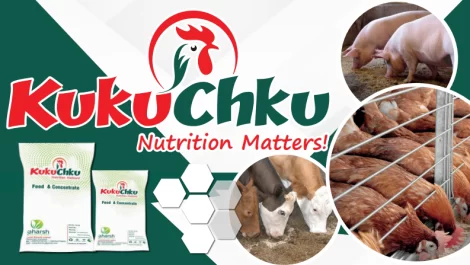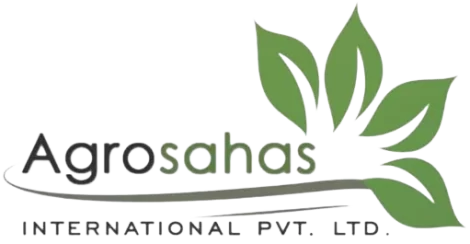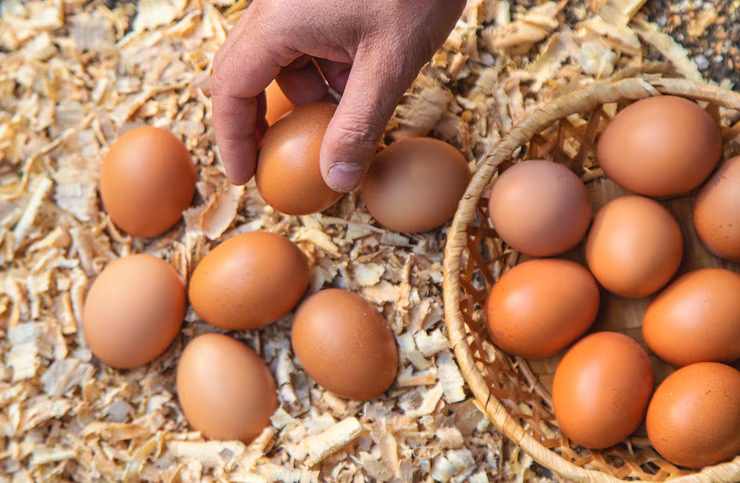In the world of poultry farming, the quality of eggs produced by laying hens is of paramount importance. High-quality eggs not only satisfy consumer demand but also boost farm profitability. At Kukuchku Animal Feeds and Concentrates, we understand that the key to producing top-quality eggs lies in the nutrition provided to your layers. In this blog, we’ll explore how feed influences both the quality and quantity of eggs, how nutrition affects egg quality, and how Kukuchku’s layer feeds are designed to help you achieve the best results.
How Does Feed Influence the Quality and Quantity of Eggs?
The feed provided to laying hens plays a crucial role in determining the quality and quantity of the eggs they produce. A balanced diet ensures that hens receive the right nutrients, which are essential for maintaining health, enhancing egg production, and ensuring that the eggs are of high quality. Here’s how feed impacts egg production:
- Egg Quantity: The energy content and protein levels in the feed directly influence the number of eggs a hen can produce. Feeds rich in energy help sustain the hen’s daily activities, including egg production, while adequate protein supports the development of egg white and yolk.
- Egg Quality: The quality of eggs—measured by shell strength, yolk color, and egg size—is heavily influenced by the nutrients provided in the feed. Essential nutrients like calcium, phosphorus, and vitamin D are critical for strong eggshells, while other vitamins and minerals contribute to the overall egg quality.

How Does Nutrition Affect Egg Quality?
Nutrition has a profound impact on various aspects of egg quality, including:
- Shell Strength: Calcium is the most critical nutrient for eggshell formation. Hens that receive adequate calcium, along with vitamin D and phosphorus, produce eggs with stronger shells. This reduces the likelihood of breakage during handling and transportation, ensuring that more eggs reach the market in perfect condition.
- Yolk Color: The color of the egg yolk is largely influenced by the presence of pigments like carotenoids in the feed. A diet rich in yellow or orange pigments, such as those found in corn or marigold petals, leads to deeper yolk colors, which are often preferred by consumers.
- Egg Size: The overall protein content of the feed affects the size of the eggs. High-quality proteins are necessary for the development of larger eggs, which are typically more desirable in the marketplace.
- Egg White Quality: The protein content and amino acid profile of the feed also determine the quality of the egg white. A diet that is rich in essential amino acids helps produce firm, clear egg whites, which are indicative of fresh, high-quality eggs.
How Do You Improve Egg Quality in Layers?
Improving egg quality in layers requires a strategic approach to nutrition. Here are some key steps:
- Ensure Adequate Calcium Intake: Provide a diet with sufficient calcium, ideally around 3.5% to 4% of the total feed. Consider using calcium supplements like limestone or oyster shell to meet these requirements.
- Balance Protein and Energy: The right balance of protein and energy in the feed is crucial. Aim for a feed that provides around 16% to 18% protein, depending on the age and production stage of the hens. This will support both egg production and egg size.
- Incorporate Essential Vitamins and Minerals: Include vitamins A, D, E, and B-complex, along with minerals like phosphorus, selenium, and zinc, to support overall health and improve egg quality. Vitamin D, in particular, aids in calcium absorption, enhancing shell strength.
- Use High-Quality Ingredients: The quality of the ingredients used in the feed directly impacts the quality of the eggs. Ensure that your feed contains high-quality grains, protein sources, and natural pigments to achieve the best results.

What Are the Nutritional Requirements for Layer Feed?
Layer feed must be formulated to meet the specific nutritional needs of laying hens. The key requirements include:
- Protein: 16% to 18% protein is necessary to support egg production and maintain the health of the hens.
- Energy: Approximately 2,800 to 3,000 kcal/kg of energy is required to fuel daily activities and egg production.
- Calcium: 3.5% to 4% calcium is essential for strong eggshells.
- Phosphorus: 0.4% to 0.5% phosphorus, which works alongside calcium to support shell formation.
- Vitamins and Minerals: A comprehensive mix of vitamins and minerals, including vitamin D, selenium, and zinc, is crucial for overall health and egg quality.
At Kukuchku, our layer feeds are meticulously formulated to meet these nutritional requirements, ensuring that your hens produce the highest quality eggs possible.
How Kukuchku Layer Feeds Make a Difference
Kukuchku’s layer feeds are designed with the latest nutritional science in mind. Here’s how our feeds stand out:
- Optimized Formulas: Our feeds are optimized for both protein and energy content, ensuring that your hens receive the nutrients they need to produce large, high-quality eggs consistently.
- Calcium-Rich: We include premium sources of calcium to ensure that eggshells are strong and durable, reducing losses from breakage.
- Enhanced Yolk Color: Our feeds are fortified with natural pigments to enhance yolk color, meeting consumer preferences for deep yellow to orange yolks.
- Balanced Vitamins and Minerals: We ensure that all essential vitamins and minerals are included in the right proportions to support overall hen health and peak egg production.
Conclusion
The role of nutrition in egg quality cannot be overstated. By choosing Kukuchku Layer Feeds, you’re ensuring that your hens receive the best possible nutrition, leading to high-quality eggs with strong shells, vibrant yolks, and firm whites. Whether you’re a small-scale farmer or managing a large commercial operation, Kukuchku’s feeds are the key to maximizing both the quality and quantity of your egg production.




